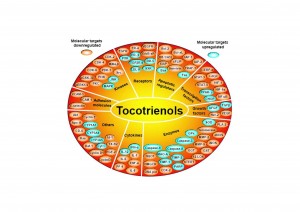Acute inflammation is an essential part of the body’s defences against injury and pathogen attack. Chronic unregulated inflammation, however, is injurous to health. Many medical conditions like cardiovascular disease and cancer share a common pathway in chronic inflammation. Examples include the helicobacter pylori, hepatitis B and human papiloma viruses that results in chronic inflammation at the sites of infection leading to increased risk of gastric, liver and cervical cancers. Chronic Inflammation involves constant upregulated inflammatory signals, bringing forth overload of immune cells that may over time result in tissue abnormalities (Fig 1). In cardiovascular disease, chronic inflammation plays a central role throughout the various stages of atherosclerosis ─ from plaque deposition to blood clot formation.
Fig 1. Molecular Targets of Tocotrienols. Image from Aggarwal, et al. Tocotrienols, the vitamin E of the 21st century: its potential against cancer and other chronic diseases. Biochem Pharmacol, 2010. Click on image for full view.
Vitamin E Tocotrienol Targets Key Inflammatory Markers
Tocotrienol exhibits anti-inflammatory abilities, suggesting its potential role in addressing a wider range of medical conditions including diabetes and cancer. [1] Tocotrienol targets inflammatory molecules, such as phospholipase A2, 12-lipoxygenase, cyclooxygenase-2, and NF-Кβ [2]. The NF-Кβ transcription factor is a central player in the regulation of inflammation and immune responses. Consequently, problems with NF-Кβ regulation have been implicated in the development of diverse forms of diseases including autoimmune disorders and certain cancers.
Scientists have demonstrated that gamma-tocotrienol regulates NF-Кβ activation, while gamma-tocopherol has no effect. According to the scientists from the MD Anderson Cancer Center, their “results demonstrate that gamma-tocotrienol is a potent inhibitor of NF-Кβ activation, which may explain its anti-angiogenic, anti-proliferative, pro-apoptotic, anti-metastatic, anti-inflammatory, and immunomodulatory effects.” Moreover, they pointed out that their “data are in agreement with other published reports that tocotrienol is a superior molecule among the members of the family of Vitamin E.” [3]
Collectively, results from a study by Yam, et al showed that tocotrienol reduces levels of prostaglandin E2 accompanied by the down-regulation of cyclooxygenase-2 gene expression suggesting that tocotrienols are better anti-inflammatory agents than α-tocopherol.[4]
Read Top Articles
3. Aggarwal BB, et al. Targeting Inflammation for Prevention and Treatment of Cancer by Tocotrienols: Food for Thought in PIPOC, 2007.

